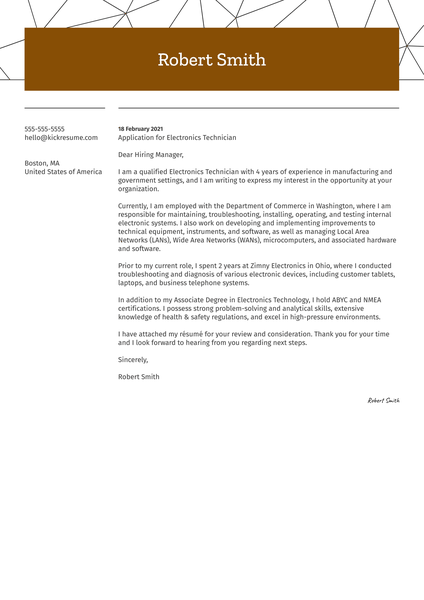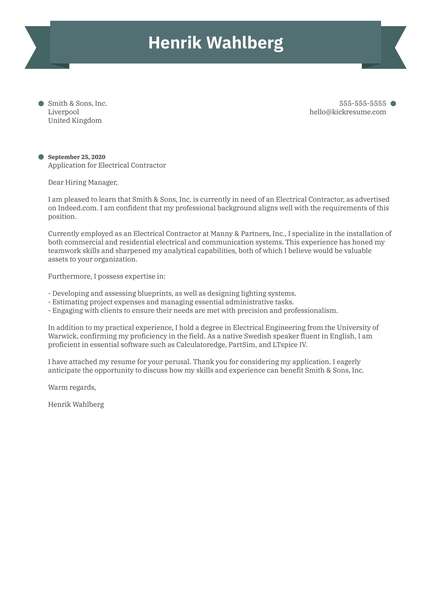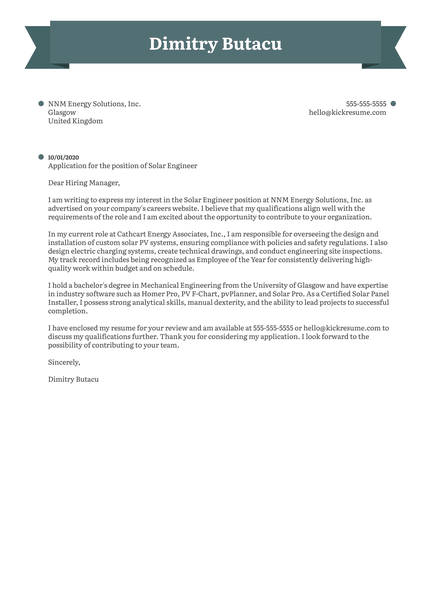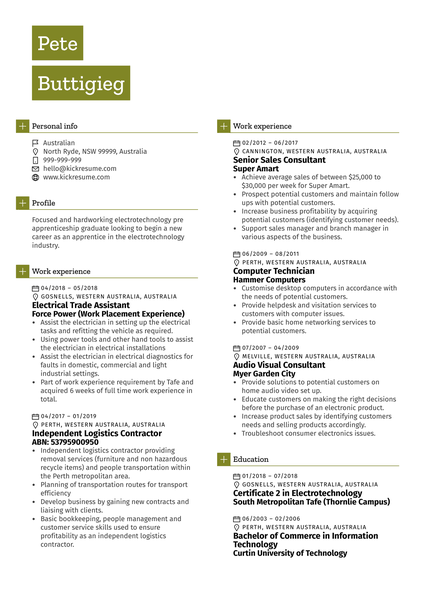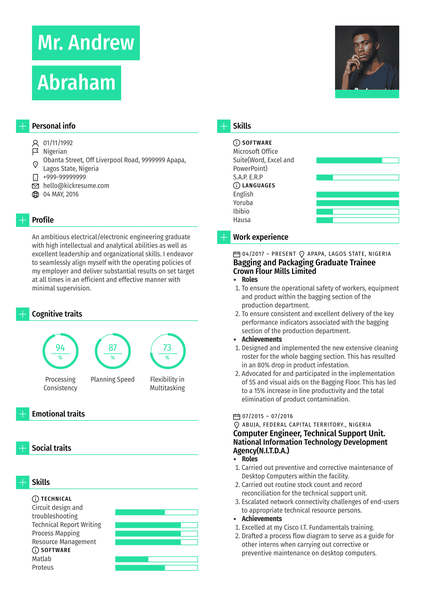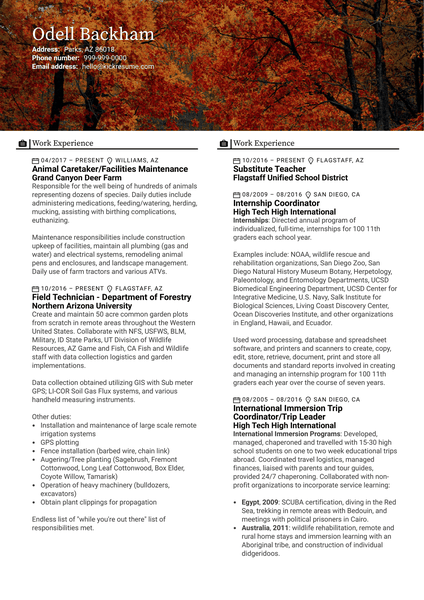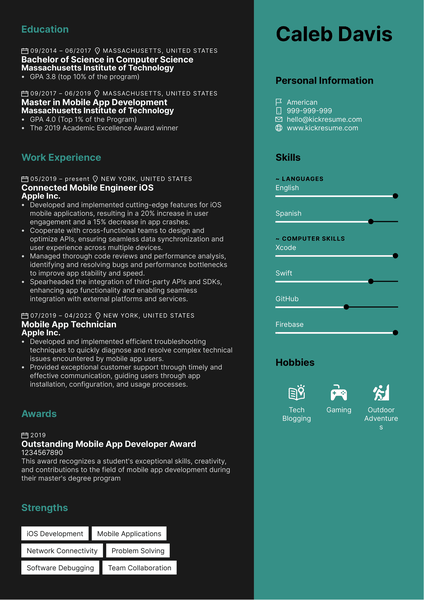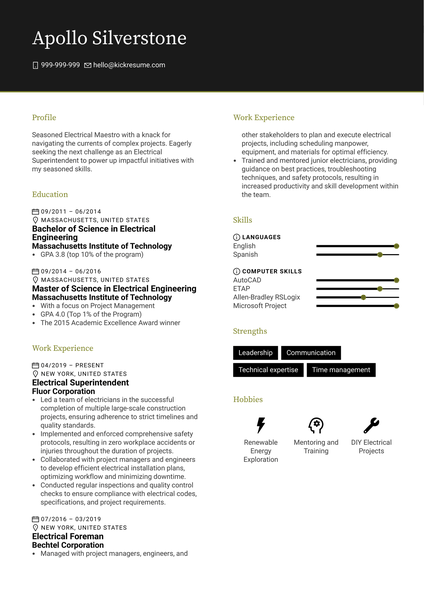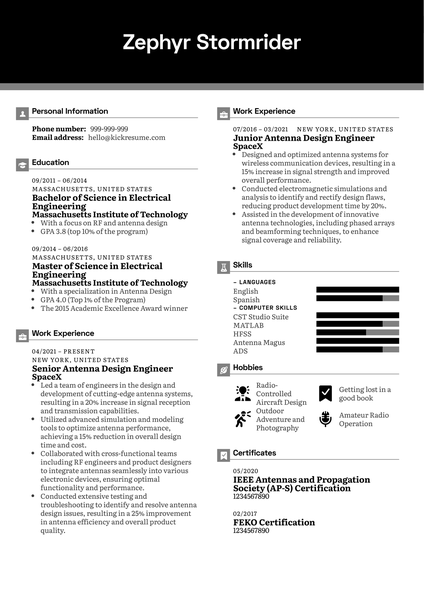Ignite your job application with our top tips on how to write an electrical engineer cover letter. Light up your career prospects with our expert examples and handy suggestions.
This guide will spark your writing potential, ensuring you always stay current in the job market. Read on and learn all about:
- Getting the formatting right for your electrical engineer cover letter
- Creating an eye-catching header for your cover letter
- Crafting a compelling cover letter headline
- Personalizing the greeting of your electrical engineer cover letter
- Building a robust introduction for your cover letter
- Highlighting your electrical engineering skills and achievements
- Drafting a persuasive conclusion for your cover letter
- Avoiding common mistakes in an electrical engineer cover letter
- Understanding the average salary and job prospects for electrical engineers
- Using helpful resources for electrical engineers during your job search
1. How to properly format your electrical engineer cover letter
Just like a well-designed circuit board, your cover letter needs to be clean, organized and efficient. Here's how to electrify your format, making it smooth to read and easy to navigate:
- Page layout: Use a standard page layout, preferably A4 size. Keep a 1-inch margin on all sides to create a good frame for your text.
- Font style & size: Choose a professional, easy-to-read font. Remember, your cover letter isn't the place to showcase your love for quirky fonts. Stick with ones like Arial, Calibri, or Times New Roman typically in size 10 or 12.
- Alignment: Unless you're in the UK, align your text to the left. This conducts your reader's eye naturally from top to bottom.
- Spacing: Keep your paragraphs short with consistent spacing between them. It improves readability, like following the path of least resistance in a circuit.
Remember, your cover letter is your professional introduction. It's vital to make a bright first impression!
2. How to write an effective electrical engineer cover letter header
Just as a blueprint guides an electrical wiring project, the header of your cover letter directs the flow of information. It's that crucial starting point of your document that introduces you, and makes it easy for employers to contact you.
Let's break down what your header should contain:
- Your contact information: This includes your name, address (though this can be optional), telephone number, and email address.
- The date: Including the submission date is important to show you've recently tailored this application to the job at hand.
- The employer's contact information: This should include the name of the recipient (if known), their position, company name, and address.
Now let's look at a few examples:
Incorrect cover letter header example
John Doe
john.doe@gmail.com
Why is this example weak? This header doesn't include any contact details beyond an email address. It's missing a contact number, the current date, and any details about the recipient.
Correct cover letter header example
John Doe
1234 Network Grove
Tech City, TE 56789
(123) 456-7890
john.doe@gmail.com
October 27, 2023
To: Ms. Jane Smith
Hiring Manager
XYZ Networks
123 Tech Parkway
Software City, SC 12345
Why is this header correct? This example includes all the key components of a cover letter header. It contains John’s contact details, the correct date and the employer's detailed contact information. This formatting ensures your cover letter can easily find its way to the right desk even outside the digital world.
3. How to write a compelling cover letter headline
Your headline is like a circuit breaker — it instantly captures attention and puts focus where it matters. It's a short but powerful statement conveying your intent and professional background.
Follow these tips to craft an engaging headline:
- Keep it short: Limit your headline to one line that concisely summarizes your career goal or unique value proposition.
- Use job titles: Incorporate your current or desired designation to make the headline more relevant.
- Make it unique: Stand out by demonstrating a key strength, a noteworthy achievement, or an important qualification.
Now, let's look at examples of weak and strong headlines:
Weak cover letter headline example
Electrical Engineer Seeking Employment
Why is this headline weak? It’s simply vague, fails to differentiate the candidate, and lacks enthusiasm.
Strong cover letter headline example
Award-Winning Electrical Engineer with a Focus on Sustainable Energy Solutions
Why is this headline strong? It immediately showcases your qualification, specialization, and achievement. It identifies the candidate as an electrical engineer, shows a unique area of expertise (sustainable energy solutions), and also highlights an achievement (award-winning), making it engaging and attractive to hiring managers.
4. How to customize the greeting on your cover letter
Just as a circuit needs a switch to initiate power flow, your cover letter needs a personalized greeting to kickstart connection with the hiring manager. This simple touch can light up your application among a myriad of generic ones.
It shows that you've taken the time to research and cater your application to the specific hiring manager and company.
The first step is to find the correct name. Often, it's listed in the job description. If not, a quick search on the company's website, LinkedIn, or even a phone call to the company can reveal the name of the hiring manager or recruiter.
Examples of personalized greetings
Dear Ms. Peterson,
Dear Ms. Ann Peterson,
Dear Hiring Manager Ann Peterson,
No Name? No Problem: Sometimes, despite your best efforts, you might not be able to find a name. In such cases, it's better to use a generic but professional greeting rather than guessing.
Dear Hiring Manager, — It’s a safe, widely accepted choice.
Dear Recruiting Team, — It could work if applying to a large company where a team is likely to be hiring.
Dear [Company Name] Team, — It shows that, though you don't know the name, you've tailored the application to the company.
Regardless of the specific phrase you choose, the key to a successful greeting is making it as personal and targeted as possible. This sets a positive, professional tone for the rest of your cover letter.
5. How to write a strong introduction to your electrical engineer cover letter
Initiating your cover letter strongly is like establishing a good power supply. The introduction of your cover letter sparks the initial interest about you as a candidate.
In essence, an introduction contains three elements:
- A brief overview of your professional and academic history, highlighting your key achievements and specialized skills.
- A clear statement on why you’re applying for the position, often linked with what value you can bring to the firm.
- A mutual connection, if you have one. It's a good idea to bring up any individual who can vouch for your skills and work ethic early, as this piques the reader's interest.
Now, let's have a look at some examples:
Weak cover letter opening example
I am a professional electrical engineer and I want to apply for the position at your company.
Why is this intro weak? While this basic introduction is factually accurate, it's too straightforward, lacks energy and enthusiasm, and doesn't give the reader any compelling reason to continue reading.
Here’s a strong opening example for an experienced electrical engineer
With a robust 7-year track record of designing innovative electrical systems and a Master’s degree in Electrical Engineering, I am excited to apply for the Electrical Engineer position at XYZ Corp. In my previous role at ABC Inc., I led a team that successfully reduced energy consumption by 25%. My mentor at ABC Inc. and your former colleague Mr. John Doe encouraged me to apply.
Why is this a good opening? It promptly details the candidate's professional history and academic background, and exhibits their achievement. It also blends a declaration of intent to bring value to the new employer and a noteworthy mutual connection.
If you’re freshly out of school and have no previous work experience, fret not. Drawing attention to relevant academic achievements, coursework, and projects can set you apart and engage prospective employers.
Here’s an example of a strong opening for a fresh graduate
As a recent honors graduate in Electrical Engineering from Tech University, I am eager to bring my strong foundational knowledge and fresh perspective to the Electrical Engineer role at XYZ Corp. My final year project, which won the University Innovation Award, revolved around using AI to optimize energy consumption.
Why is this example correct? Despite the lack of extensive professional history, this introduction effectively sells the candidate’s strong academic baseline, the freshness they're bringing along, and an achievement that sets them apart from other fresh graduates.
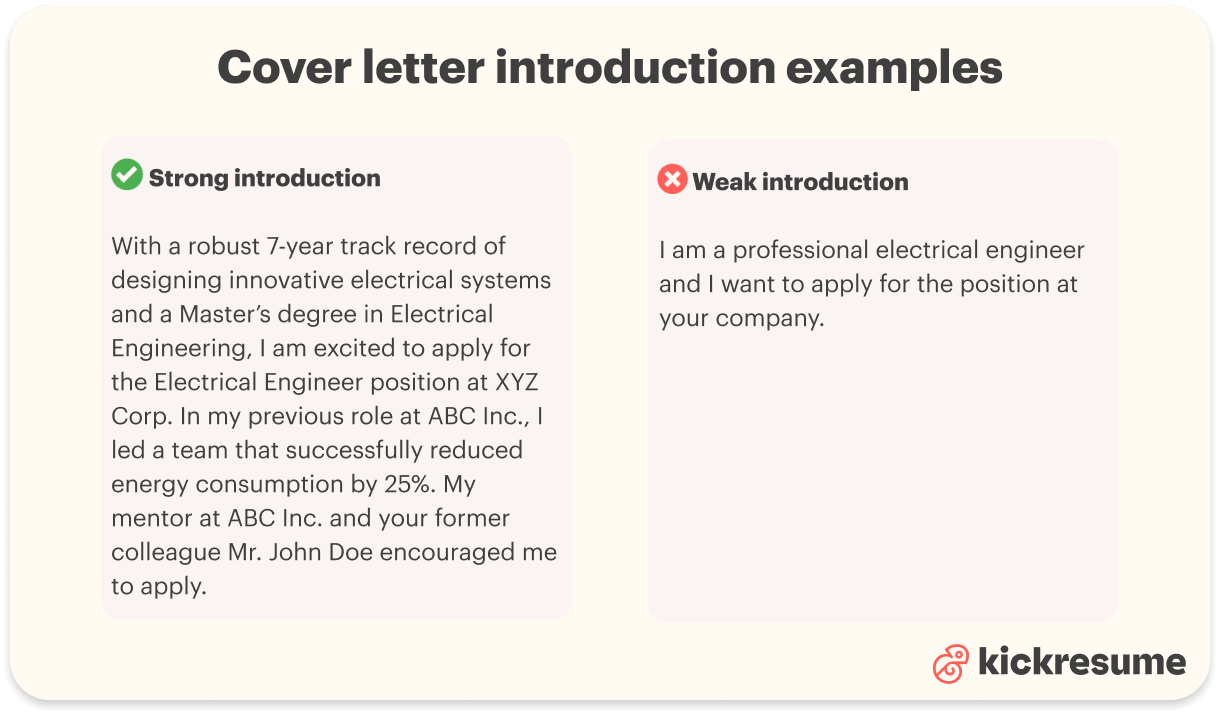
6. How to highlight your top skills and accomplishments
Just like a well-routed and clear circuit board diagram, the body of your cover letter needs to showcase your skills and achievements with precision and clarity.
The body of your cover letter should ideally contain two to three paragraphs. Start by explaining why you're interested in the role and the company, followed by outlining your most relevant skills and achievements.
The key to the body of a winning cover letter is relevancy and specificity. Refer back to the job description and align your skills with what the employer seeks.
Here are some skills you might want to highlight in your cover letter
- Proficiency in electrical simulation software
- Strong knowledge of electrical code standards
- Ability to design and implement minor and major electrical systems
- Strong problem-solving skills
- Great attention to detail
Once you've identified your relevant skills that align with the job description, it's time to showcase them effectively within the body of the cover letter.
Body paragraph example for an experienced professional
In my recent position as Senior Electrical Engineer at ABC Corporation, I played an integral role in reducing energy costs by 20%, while maintaining 100% compliance with national electrical codes. My proficiency in using electrotechnical software, my strong problem-solving skills, and my rigorous attention to detail were crucial contributors to this milestone.
Why is this an effective cover letter paragraph? It does a fine job of showing, rather than telling. The candidate's capabilities in software proficiency, problem-solving, and attention to detail aren't just mentioned, they are directly tied to a significant accomplishment — reducing energy costs by 20%.
Are you a fresh graduate? Experience isn't just accrued through professional roles. Internships, coursework, university projects, and even personal hobbies that pertain to electrical engineering can create a strong impression.
Body paragraph example for a fresh graduate
While my professional experience is limited, my coursework, as well as my final year project, have prepared me to step into the professional sphere. My project focused on designing and implementing a small-scale electrical system, which successfully lit up our entire campus auditorium using sustainable energy. This project helped me improve my software proficiency, problem-solving skills, and attention to detail.
Why is this example effective? It explicitly mentions skills and directly correlates them with specific achievements. The body of the cover letter creates a clear, personalized path towards the conclusion.
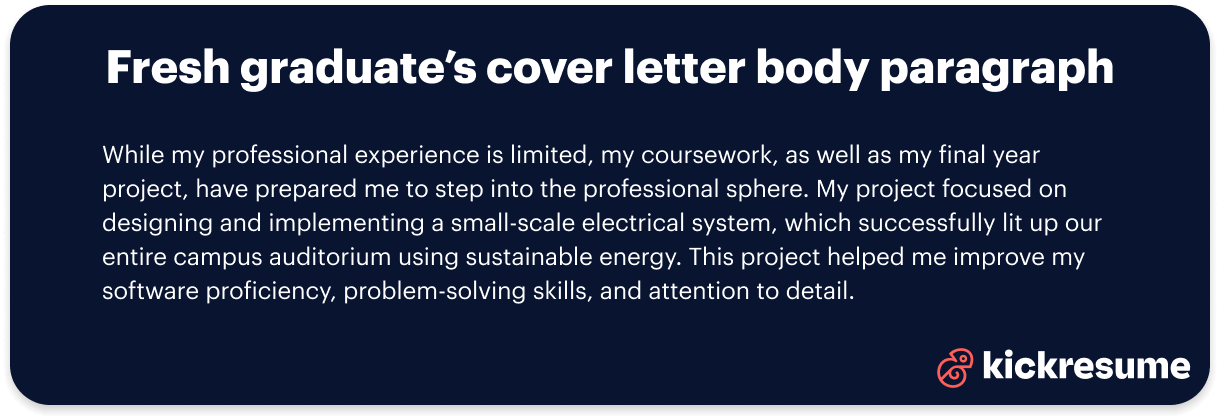
7. How to conclude your electrical engineer cover letter
A strong conclusion to your cover letter is the equivalent of an efficiently grounded electrical system — it adds stability and completeness to what you've constructed before it.
It's your final chance to emphasize your interest in the role and leave a lasting impression. An effective conclusion not only reaffirms your suitability for the job, but also outlines the next steps.
Ensure you mention how and when you can be contacted and when you hope to hear from them. An intention to follow up can show determination and enthusiasm. Don't forget a formal sign-off to maintain professionalism.
Incorrect cover letter conclusion example
I hope you will hire me.
Sincerely,
[Your Name]
Why is this conclusion incorrect? It comes off as desperate rather than confident. It doesn't suggest a sureness in ability or make mention of any follow-up.
Correct cover letter conclusion example
With my strong technical skills and demonstrated track record in improving efficiency, I'm confident I could make significant contributions as part of your team at XYZ Corp.
I look forward to the possibility of discussing the position and my qualifications further. Please feel free to contact me at your earliest convenience. Thank you for considering my application. I'll follow up on my application within a week.
Sincerely,
[Your Name]
Why is this example correct? This conclusion reaffirms the candidate's suitability for the role, shows eagerness to explore the opportunity further, offers a timeline for follow-up, and ends on a polite and professional note.
8. How to avoid common mistakes in your electrical engineer cover letter
Even in a perfectly designed electrical system, a loosely connected wire can disrupt the entire operation. Similarly, common mistakes can disrupt the smooth flow of your cover letter narrative. Here are some pitfalls to avoid:
- Vagueness: Just stating you're an electrical engineer isn't enough. Specify the niche areas you're skilled at, the projects you've handled, or the improvements you've brought to previous roles.
- Negativity: Never highlight your lack of experience or skill in your cover letter. Focus on what you can offer, not what you can't.
- Failing to tailor your letter: A generic cover letter is a missed opportunity. Tailor your letter to each position and company. Use the job description as a guide to understanding what the employer values.
- Spelling and grammar mistakes: A misspelled word or grammar mishap can appear unprofessional. Always proofread your letter and consider having a friend or family member do so too.
- Wrong company name or position: Always double-check the details. There's nothing more off-putting for a hiring manager than seeing a different company's name on your cover letter.
Keep your resume and cover letter updated, just like the latest electrical standards, and maintain an unyielding focus on precision.
9. Average salary and job outlook for electrical engineers
Knowing the current job market trends and earning potential can help you navigate your career more effectively. As per information from the Bureau of Labor Statistics (BLS), as of May 2022, the average annual salary for electrical engineers was $104,610.
But it's not just the attractive potential earnings that should catch your attention. The field of electrical engineering also expects healthy growth in the coming years. BLS predicts a 5 percent growth in overall employment of electrical and electronics engineers from 2022 to 2032. This growth rate is faster than the average for all occupations, which signals promising opportunities in the field.
Putting numbers to this growth, approximately 17,800 openings for electrical and electronics engineers are projected each year, on average, over the next decade.
Knowing these statistics can surely help you manage your career path in sync with the industry trends and align your job search efforts more effectively.
10. Useful resources for electrical engineers during job search
Just like the right tools are essential in carrying out electrical projects efficiently, there are key resources that can support and streamline your job search process:
- Industry networks: Join professional organizations such as the Institute of Electrical and Electronics Engineers (IEEE), which can provide networking opportunities, industry news, and professional development resources.
- Job search websites: In addition to general job search sites like Indeed or LinkedIn, consider industry-specific job boards like IEEE Job Site or Engineering.com Jobs.
- Social media: Utilize platforms such as LinkedIn to network with other professionals in your field, scout potential job opportunities, and showcase your portfolio of projects. You can now turn your LinkedIn profile into a polished resume within a few seconds.
- Continuing education: Keep your skills up-to-date by undertaking relevant courses on platforms like Coursera, Lynda, or Khan Academy.
- Career coaches or recruitment agencies: Reach out to professional coaches or recruitment agencies specializing in engineering profiles. They can provide personalized advice and direct you to unadvertised job openings.
- Engineering publications: Staying informed about industry trends, innovations, and news can enhance your competitive edge. Publications like the "IEEE Spectrum," "Electronics Weekly," and "EDN Network" are invaluable resources for electrical engineers. They not just keep you in the loop but might occasionally list job postings, too.
Remember, job seeking is a process that requires strategic planning, preparation, and patience. Utilize all the resources at hand and keep your skills sharp, just like the best of electrical engineers meticulously calibrating their tools. Good luck propelling your career forward!
Electrical Engineer Cover Letter FAQ
How long should my electrical engineer cover letter be?
A cover letter shouldn't exceed one page. Usually, three to four short paragraphs would suffice to introduce yourself, highlight your skills and experiences, and express your interest in the job.
Should my electrical engineer cover letter repeat what's on my resume?
While your cover letter should complement your resume, it shouldn't simply reiterate its content. Instead, use it to build on the high points in your resume or explain important aspects in more detail.
Is it necessary to include a cover letter with my application?
Although some job postings might not explicitly request a cover letter, it's always a good idea to include one. A well-crafted cover letter can give the employer additional insights about your skills, experiences, and enthusiasm for the job which your resume alone may not convey.
I want to apply to multiple job postings. Can I use the same electrical engineer cover letter for all of them?
While you may use a similar structure for each application, it's crucial to tailor your cover letter to each job description. Employers can often tell when a candidate uses a generic cover letter, and it may make your application appear less competitive.
Can I include any kind of hobby or interest in my electrical engineer cover letter?
Yes, but it should be relevant to the job or highlight transferable skills. For example, a hobby that demonstrates problem-solving skills or intricate handiwork could be applicable. Remember, every piece of information in your cover letter should serve the purpose of showcasing why you'd be a great fit for the job. If your hobby doesn't add to that narrative, it's probably best left out.

